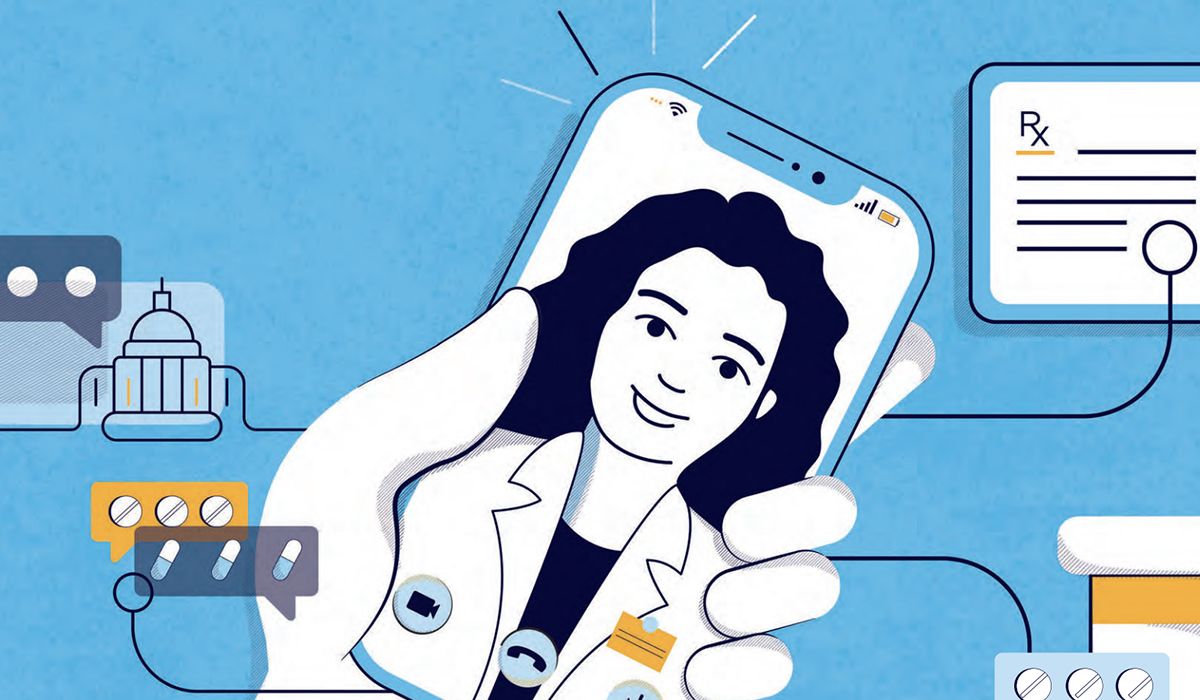Early in the coronavirus disease 2019 (COVID-19) pandemic, telehealth services were eagerly embraced, with more than half of clinicians in most specialties delivering care virtually. Even as many medical practices return to in-person consultations, the use of telepsychiatry and other virtual mental health services has remained strong. Over the past two years, telehealth and online pharmacy start-ups offering quick and convenient access to mental health treatment have become increasingly popular.
Their availability is at least in part due to Drug Enforcement Administration’s (DEA’s) March 2020 decision to loosen remote prescribing restrictions for Schedule III through Schedule V controlled substances (CS) for the duration of the public health emergency. This policy change rolled back provisions of the Ryan Haight Online Pharmacy Consumer Protection Act, allowing health care providers to issue clinically appropriate CS prescriptions via telehealth without first conducting an in-person medical evaluation. The bill is named for Ryan Haight, a teenager who died from an overdose of Vicodin® prescribed online with an inadequate medical evaluation by a physician who had never spoken to Ryan and sold by an online pharmacy collaborating with the prescribing physician. The act was passed to limit illegal and unsafe sales of CS via the internet, but even back in 2008, the act did recognize that there is a place for legitimate prescribing of CS using the internet via a telemedicine visit.
Before the pandemic, DEA kept telemedicine exceptions very narrow to avoid concerns of diversion, overprescribing, and other risky prescribing practices. This narrow interpretation of the Ryan Haight Act limited patients’ ability to use telehealth to obtain CS prescriptions as a part of their treatment plan. With limited availability of local, in-person mental health providers, especially those with the authority to prescribe CS, patients were often left with nowhere to turn. This is the gap that new mental health start-ups offering therapy and prescriptions for conditions such as anxiety, depression, insomnia, substance use disorder, and attention deficit hyperactivity disorder (ADHD) have aimed to fill. However, with reports of significant increases in the amount of amphetamine prescriptions filled in the United States over the past two years (a 16% increase from 2019 to 2021), pharmacists and DEA have started to question prescribing practices, particularly when it comes to stimulants used to treat ADHD.
Earlier this year, online pharmacy company Truepill halted filling prescriptions for Schedule II stimulants after reports of concerns about prescribing from health care providers formerly employed by Cerebral, a mental health start-up. Cerebral offers therapy and medication for a low monthly cost. For some patients, that included prescription and delivery of ADHD medication. Following the reports, several of the nation’s largest pharmacies, including Walmart, Inc, and CVS Health, began blocking and delaying CS prescriptions issued by clinicians working for Cerebral and another mental health start-up, Done Health. In early May, the Department of Justice initiated an investigation of possible violations of the Controlled Substances Act. Cerebral has responded that there is no evidence of wrongdoing, but while the company reviews its systems and practices for ADHD, it has paused prescribing amphetamines. It is yet to be determined whether any inappropriate prescribing practices for ADHD have occurred in this case, at either the individual provider or company levels, but in the meantime, Cerebral has maintained access to treatment for patients with other mental health conditions. Mental health conditions such as anxiety and substance abuse disorder have been exacerbated by the COVID-19 pandemic, and telehealth providers may play an important role in reaching patients.
As seen early in the opioid epidemic, overprescribing is a concern whether in brick-and-mortar facilities or via telehealth, and efforts must be made to curtail this inappropriate practice. It is also important to distinguish legitimate telehealth – which should involve clinician-patient interaction that meets the appropriate standard of care, just as in-person interactions should – from telemarketing and other illegal internet drug sales. Online websites that peddle medications without a prescription are not considered telehealth providers. DEA has also recently been concerned about illegal online sales of ADHD medication. In April, Food and Drug Administration and DEA issued joint warning letters to the owners of two websites illegally selling Schedule II CS, kubapharm.com and premiumlightsupplier.com.
The demand for health care services and prescriptions on the internet will not disappear, as patients benefit from the convenience and accessibility. The important job of regulators will be to ensure that patients can continue to access legitimate medical services via the internet while strictly enforcing and updating rules to root out bad actors.
